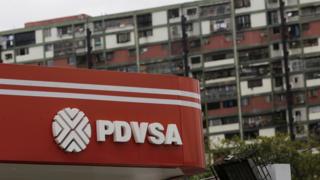 Image copyright Reuters
Image copyright Reuters The government of Venezuela held this Wednesday the reduction of production announced by OPEC (Organization of Petroleum Exporting Countries) in the hope that the measure will raise the price of crude and that will relieve the acute crisis of the country.
OPEC, which he described as “historic” the agreement, the first reduction since 2008, looking to”balance the market” and help to increase the price of the barrel.
In that effort will also participate for Venezuela, which will reduce its production to 95,000 barrels per day, up to a total below two million. Saudi Arabia will make the greatest sacrifice with 486.000 barrels less.
“The market is sobreabastecido and the idea is that drenemos these inventories to stabilize prices and let the market between countries OPEC and non-OPEC of 1.5 million-2 million barrels per day,” said the minister of Oil of Venezuela, Eulogio del Pino, before the meeting today, the cartel in Vienna.
And according to the data announced this Wednesday, I was happy because those figures match: next to the reduction of the 1.2 million barrels dailys (mbd) 32.5 mbd, OPEC announced that the other producing countries not integrated in the group expressed their “commitment” to reduce 600.000 barrels.
this is The fault of the offer
The OPEC considers that the great fall in the price of crude oil (estimated at 50% since 2014) is to blame, above all, of the excess of supply, something that now seeks to control.
The 14 member countries of OPEC hold together the 78% of the crude oil reserves on the planet and extracted close to 40% barrels sold in the market.
Venezuela, which has already seen reduced its production significantly due to the problems of the state-owned company PDVSA associated with the crisis in the country, was one of the countries that promoted the reduction of production.
And will form part of a monetary committee that will review the implementation of the agreement, effective from 1 January 2017 and of time which is valid for six months.
within minutes of the announcement, the price of a barrel of international benchmark increased a 9% and over $ 50.
“a Lot of fabric to cut”
however, the venezuelan Ramon Key, assistant professor of Economics and expert on energy markets, believes that even “there is a lot of fabric to cut.”
Key is not yet convinced that all of the actors are going to meet and that could lead to Saudi Arabia to return to overproduce to compensate for the loss of market caused by the reduction.
The number of overall cut is in line for what was requested by the experts to have a reaction credible in the markets.
Key considered cash the OPEC agreement if the reduction was of 1.3 mbp, a similar figure to the one reached.
The question now is to know how much you can raise the price.
“I don’t think that would go beyond the US$ 60,” he told the BBC the professor Key, who claims that in the event that you exceed this figure it is possible to then return to the initial situation.
The cause would be the increased production of oil shale, for which the united States is the main reference.
venezuelan production
a Key is considered “counter-productive” that Venezuela will have to make an additional effort of reduction of production.
With the remove of to 95,000 barrels day will be below 2 million (1,97), according to data released by OPEC on Wednesday.
Venezuela came to produce 3,20 million barrels per day in September 2008. From there, the crude oil production began to decline.
according to the figures supplied by Venezuela to the OPEC, late last year the production was 2.57 mbd and in August of this year dropped to 2,33 mbd.
The reduction announced supposed to recognize that the current is 2.06 million.
“it Is a pity that Venezuela has not been able to negotiate something better, a except,” said professor Key.
What price would need to Venezuela?
The minister Of the Pine tree said Wednesday that it expected in six months, a stable price of between US$ 60-70.
But first we will have to wait for the prices to actually increase. Then we will have to see how much and how it benefits to Venezuela, which is going through a serious crisis with the highest inflation in the world and shortages of basic products.
The economist Asdrúbal Oliveros is not as optimistic as the minister Of the Pine tree.
“The price is going to reach it is insufficient for what you need Venezuela to get out of your crisis situation. We need a price of at least US$ 62 per barrel (of venezuelan crude oil) and are now at US$ 40. And that is a Brent (crude oil international reference) of around US$ 70-75 and that’s not what is predicted for no one,” he said to the BBC.
Brent was hovering around US$ 50 on Wednesday after the OPEC agreement.
“A break”
But Oliveros considers that a price increase would be a “breather” for the government of president Nicolas Maduro, which faces a severe economic and political crisis.
“Every dollar that goes up the oil is a oxygen to the government. Every dollar (the price of a barrel) annual average is US$ 600 million in additional revenue,” he explained.
The oil revenues are the basis of the venezuelan economy because they import almost all the products and financed through the state oil company PDVSA social programs of the government of Maduro.
The fall of prices is therefore one of the main causes of the venezuelan crisis. And this is why the government is hopeful that what happened this Wednesday in Vienna will help you.
No comments:
Post a Comment